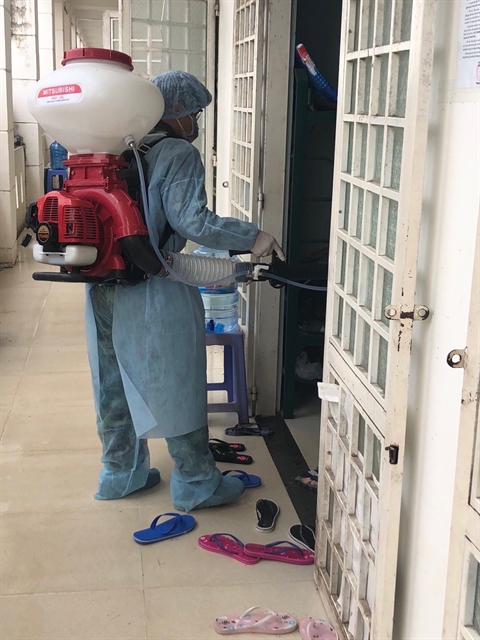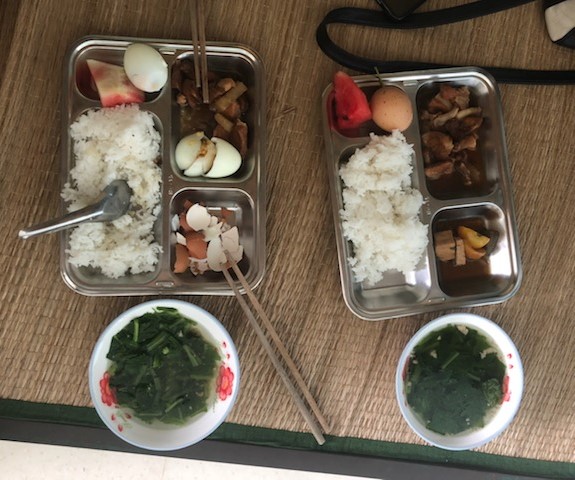 Society
Society

Personnel working in quarantines, hospitals and centres for diseases prevention and control across the country have been working hard as thousands of Vietnamese return home from abroad amid the COVID-19 epidemic.

|
| A worker disinfects rooms at the security and defence education centre in Phước Thới Ward in the Mekong Delta city of Cần Thơ, which is used to quarantine people at high risk to have Covid-19. — VNS Photo Thiên Lý |
Đ.Hằng, G.Lộc, N.Thanh, T.Lý
HCM CITY — Personnel working in quarantines, hospitals and centres for diseases prevention and control across the country have been working hard as thousands of Vietnamese return home from abroad amid the COVID-19 epidemic.
Staff at the international health quarantine centre in HCM City have not been home for the last two months, and have been working tirelessly to detect suspected cases to halt the disease’s spread in the community.
Nguyễn Tạ Minh Quang, a worker at the centre, and his colleagues were stationed at the immigration and customs areas in HCM City’s Tân Sơn Nhất airport to guide passengers, who need to get their temperature checked and make a health declaration.
They also answer questions passengers have.
All are screened for COVID-19 but also ebola and Mers-CoV.
Those with a fever are taken to doctors stationed in the airport for further examination.
Dr Nguyễn Hồng Tâm, director of the international health quarantine centre, said since COVID-19 broke out in late January, the centre’s 80 workers have been working very hard.
It began during the Lunar New Year holidays, and the staff did not spend them with their family, he said.
In the beginning they were monitoring 3,500-4,500 passengers every day, and the figure increased to 7,000, and even 11,000, when thousands of Vietnamese landed at airports, he said.
“We had to ask the Department of Health to augment personnel because our workers were overloaded.”
The centre’s staff were always stressed because they were afraid some possibly infected passengers had gone missing since several people from COVID-19 countries had eluded their efforts to quarantine them.
Protecting community
Since they were routinely in contact with people with COVID-19, they had had to strictly comply with preventive measures to avoid transmission in the community.
So, after their shift, they have to disinfect before leaving the airport. Those with children have to stay in a hotel. Some have sent their children to their grandparents’ places.
Huỳnh Thị Mỹ Ngọc and her husband work at the centre and have sent their two children to her parents’ home in her hometown.
Staff at the Department of Infectious Diseases in Bình Thuận Province’s General Hospital have asked their relatives or neighbours to take care of their children.
Phạm Thị Việt Hoa’s three children, for instance, have to take care of each other.
She and her colleagues have to work hard and even skip lunch sometimes. They have to stay back in their office since the hospital has treated nine patients with COVID-19.
Her department has 17 doctors and nurses, who, after examination or treatment, have to take off their protective gear, disinfect and change clothes.
Dr Dương Thị Lợi of the department said: “Stressed and missing our children, we encourage each other to fight. The health staff at the hospital also provide therapy to patients to reduce stress besides treatment for COVID-19.”
Dr Nguyễn Văn Thành, the hospital’s head, said there is one area for doctors and nurses to stay.
In the Mekong Delta city of Cần Thơ, at the security and defence education centre in Ô Môn District’s Phước Thới Ward, which is used as a quarantine area, its 30 employees have so far served more than 700 people including foreigners, day and night.
Their friendly attitude has comforted the quarantined people.
Phạm Thành Danh of HCM City’s District 2, who returned from Australia and was brought to the centre on March 23, said: “I felt worried at first but no longer. The room where I stay is clean and cool. The internet enables me to take part in online lessons taught by my university lecturers in Australia.”
Being quarantined at the centre is better than being at home, he said.

|
| Meals being provided to quarantined people at the security and defence education centre in Phước Thới Ward in the Mekong Delta city of Cần Thơ. — VNS Photo Thiên Lý |
Phan Hiền of Đồng Tháp Province, who returned from Singapore, said: “We are served three meals each day. The meals are ok.”
Phạm Tuấn Duy, a centre worker, said: “This is our task. We have to serve them well and make people here feel comfortable and not worried. We feel happy when they feel satisfied.”
With foreigners not familiar with Vietnamese food, the staff ask them to write the foods they want and get them, he added. — VNS




